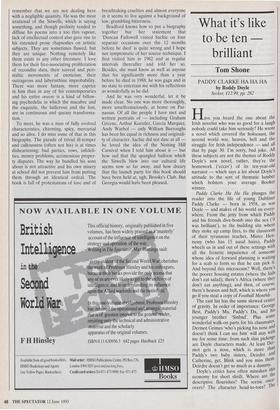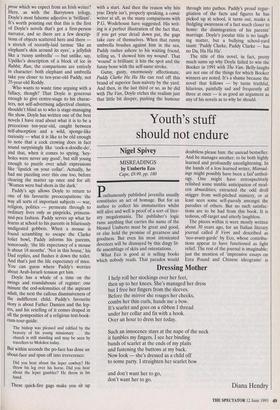What it's like to be ten brilliant
Tom Shone
PADDY CLARKE HA HA HA by Roddy Doyle Secker, £12.99, pp. 282 Have you heard the one about the Irish novelist who was so good for a laugh nobody could take him seriously? He wrote a novel which covered the holocaust, the second world war, heaven, hell and the struggle for Irish independence — and all that by page 30. I'm sorry, bad joke. All these subjects are not the themes of Roddy Doyle's new novel, rather, they're the homework (`eccer') of its ten-year-old narrator — which says a lot about Doyle's attitude to the sort of thematic lumber which bolsters your average Booker winner.
Paddy Clarke Ha Ha Ha plunges the reader into the life of young Dubliner Paddy Clarke — born in 1958, as was Doyle — and makes of his world an every- where. From the jetty from which Paddy and his friends dive-bomb into the sea (`it was brilliant'), to the building site where they stoke up camp fires, to the classroom of their tyrannous teacher, Mister Hen- nessy (who has 15 nasal hairs), Paddy wheels us in and out of these settings with all the frenetic impatience of someone whose idea of forward planning is waiting for a scab to form so that he can pick it. And beyond this microcosm? Well, there's the poorer housing estates (where the kids don't eat salad); there's Africa (where they don't eat anything); and then, of course, there's heaven and hell, which is where you go if you steal a copy of Football Monthly. The cast list has the same skewed centre of gravity. In order of importance: George Best, Paddy's Ma, Paddy's Da, and his younger brother `Sinbad'. Plus some wonderful walk-on parts for his classmates• Dermot Grimes 'who's picking his nose and doesn't think I can see him' will stay with me for some time: from such slim pickings are Doyle characters made. At least Der- mot gets a nose, which is more than Paddy's two baby sisters, Deirdre and Catherine, get. Blink and you miss them• Deirdre doesn't get so much as a dummy.. Doyle's critics have often mistaken this economy for short shrift. Where are the descriptive flourishes? The scenic once- overs? The character head-to-toes? The prose which we expect from an Irish writer? Here, as with the Barrytown trilogy, Doyle's most fulsome adjective is 'brilliant'. It's worth pointing out that this is the first of Doyle's novels that's got a first-person narrator, and so there are a few descrip- tions of objects scattered here and there a stretch of recently-laid tarmac 'like an elephant's skin around its eyes', a jellyfish like a 'runny umbrella' — but unlike, say, Updike's description of a block of ice in Rabbit, Run, the comparisons are entirely in character: both elephant and umbrella take you closer to ten-year-old Paddy, not 35-year-old Roddy.
Who wants to waste time arguing with a fallacy, though? That Doyle is generous enough to give centre-stage to his charac- ters, not self-advertising adjectival clusters, shouldn't blind us to who is stage-managing the show. Doyle has written one of the best novels I have read about what it is to be a precocious ten-year-old, caught between self-absorption and a wild, sponge-like curiosity — what it is like to be old enough to note that a cock crowing does in fact sound surprisingly like 'cock-a-doodle-do', and that, when it comes to spying, 'key- holes were never any good', but still young enough to puzzle over adult expressions like 'lipstick on your collar'. Actually, he had me puzzling over this one too, before clearing the matter up once and for all: `Women were bad shots in the dark.'
Paddy's age allows Doyle to return to one of his favourite preoccupations: the way all sorts of important subjects — war, religion, politics — permeate through to ordinary lives only as pinpricks, princess- and-pea fashion. Paddy serves up what he learns at school to his parents in hilariously undigested gobbets. When a mouse is found scrambling to escape the Clarke toilet bowl, Paddy informs his parents, sonorously, 'the life expectancy of a mouse is about 18 months'. 'Not in this house,' his Dad replies, and flushes it down the toilet. And that's just the life expectancy of mice. You can guess where Paddy's worries about Arab-Israeli tension get him.
Doyle has a whale of a time on the swings and roundabouts of register: one minute the cod-solemnities of the aspirant adult, the next the callous dismissiveness of the indifferent child. Paddy's favourite story is about Father Damien and the lep- ers, and his retelling of it comes draped in all the pomposities of a religious text-book- cum-tour-guide:
The bishop was pleased and edified by the bravery of his young missionary ... the church is still standing and may be seen by travellers to Molokoi today.
But within seconds the po-face has done an about-face and spun off into irreverence:
Did you hear about the leper cowboy? He threw his leg over his horse. Did you hear about the leper gambler? He threw in his hand.
These quick-fire gags make you sit up with a start. And then the reason why hits you: Doyle isn't, properly speaking, a comic writer at all, as the many comparisons with P.O. Wodehouse have suggested. His writ- ing is a perfect illustration of the fact that, if you get your detail down pat, the gags take care of themselves. When that runny umbrella brushes against him in the sea, Paddy rushes ashore to his waiting friend, telling us, 'I showed him my wound'. That `wound' is brilliant: it hits the spot and the funny bone with the self-same stroke.
Gutsy, gusty, enormously affectionate, Paddy Clarke Ha Ha Ha can reel off this brand of superior faux-naivety by the yard. And then, in the last third or so, as he did with The Van, Doyle etches the realism just that little bit deeper, pushing the humour through into pathos. Paddy's proud regur- gitation of the facts and figures he has picked up at school, it turns out, masks a fledgling awareness of a fact much closer to home: the disintegration of his parents' marriage. Doyle's jocular title is no laugh- ing matter, but a bullying school-yard taunt: 'Paddy Clarke, Paddy Clarke — has no Da, Ha Ha Ha'.
The title of this novel, in fact, pretty much sums up why Doyle failed to win the Booker in 1991 with The Van. Belly-laughs are not one of the things for which Booker winners are noted. It's a shame because the novel that follows — by turns truthful, hilarious, painfully sad and frequently all three at once — is as good an argument as any of his novels as to why he should.



































































 Previous page
Previous page